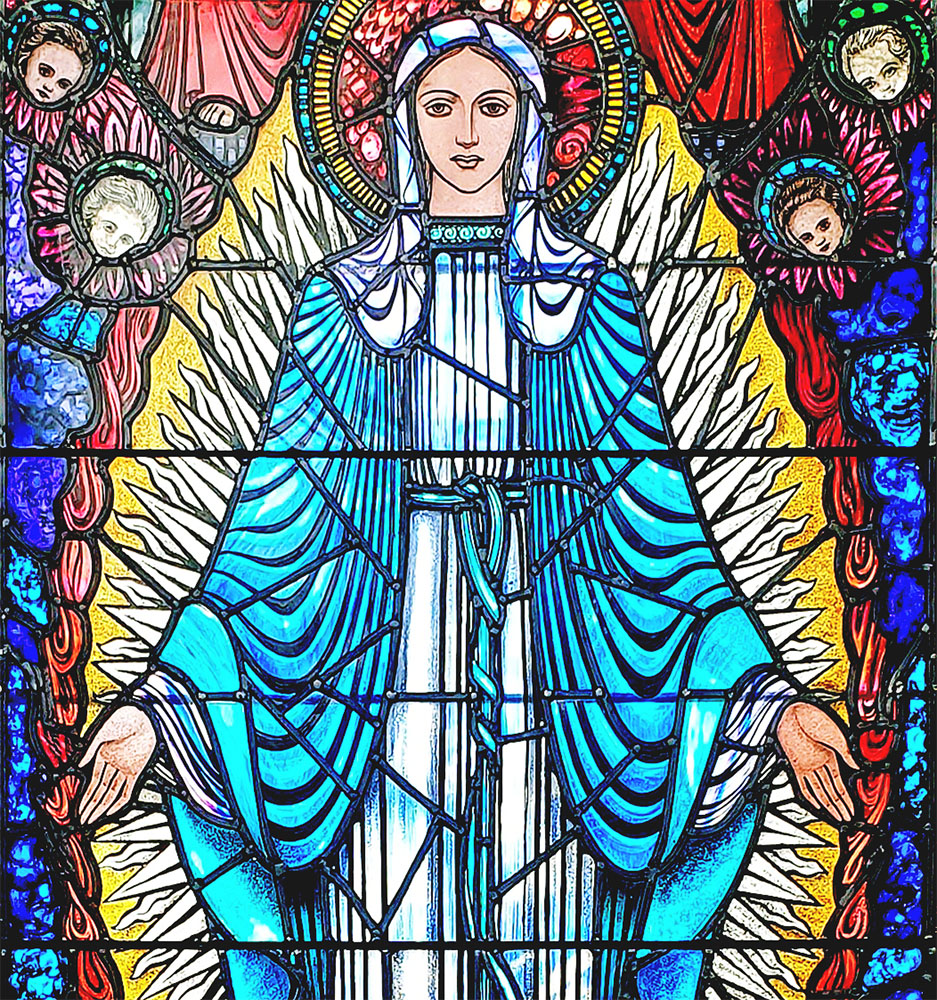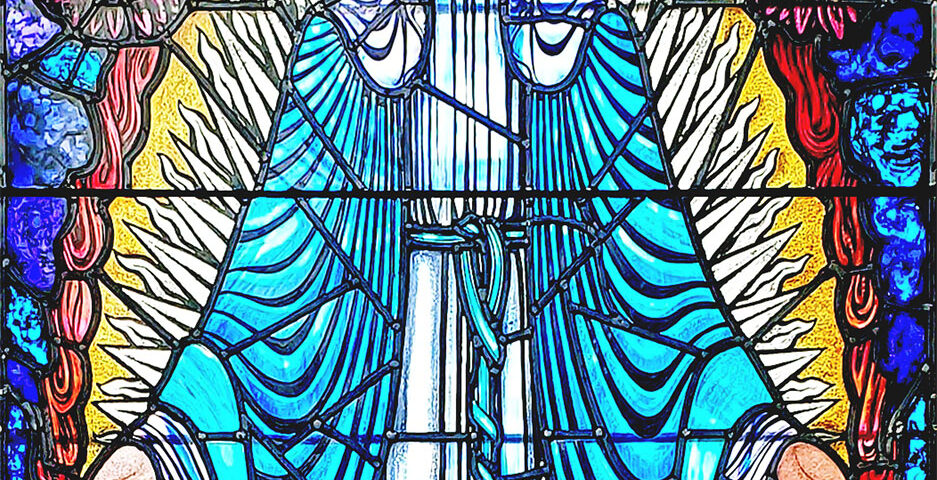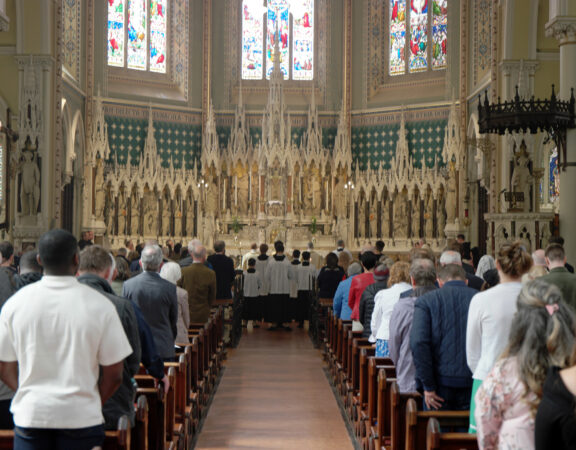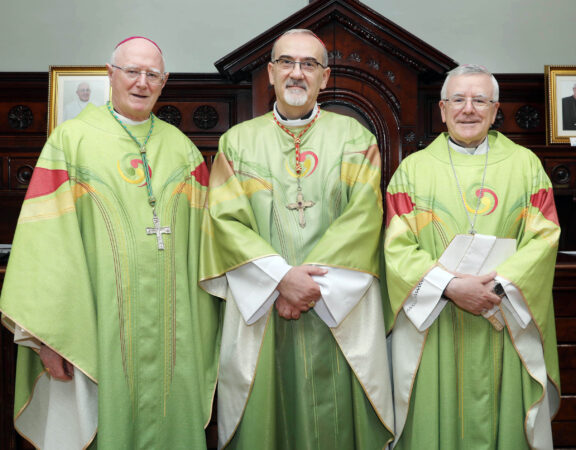Solemnity of the Assumption, 2022
Homily of Archbishop Dermot Farrell
St Mary’s Pro-Cathedral
1 His Servant in her Lowliness
Today is a day of hope. To celebrate the Assumption is to enter into the hope and the confidence God has for us: “He has looked upon his servant in her lowliness…” (Luke 1:48). This is Mary’s song, her prayer. This is the prayer of someone who was nobody! A person you wouldn’t even notice: a woman in a society in which few women were valued, a peasant in a world where the urban was dominant. But God noticed her, God spoke to her, and Mary responded.
On this day, when the Church in Ireland submits its national synthesis to the Holy See, it strikes me that the Church on this island, and across Europe, is also being brought this same road of lowliness, a road of openness and renewal, a journey towards another way of living, with God, and with each other in our common home. Seen with the eyes of faith, these days are days of hope and new life: “the Lord looks on his servants in their lowliness … he scatters the proud-hearted, the rich he sends empty away” (Luke 1:48, 51, 53—today’s Gospel).
2 The Church God Brings to Life through Jesus
The road our Lord opens up for us, is not only a road on which we follow him—the road of discipleship, but it is also a road with each other.
The week before last, at the end of his “pilgrimage of penance” to the indigenous peoples of Canada, Pope Francis spent an hour with his Jesuit confrères. There again, he returned to the theme of the Church journeying together, the synodal way. This brought me to reflect anew on various dimensions of our synodal journey these past months. In particular, I was struck by three dimensions: the true sense of synod, the faithfulness of the Holy Spirit, and the need for renewal.
2.1 People Discovering Life Alongside Each Other—the true sense of Synod
First of all, the synodal character of the Church: the Church is not only the people gathered by Christ, but also the People of God travelling along life’s road with each other as together they follow Christ. Pope Francis put is it like this: “when one says “synodal Church” the expression is redundant: the Church is either synodal or it is not Church. (Meeting with the Jesuits of Canada and Haiti, Quebec, 29th July 2022).
It’s worth taking a closer look at what we mean by “synodal.” In the end, the synodal way is nothing more and nothing less than an essential dimension of how we live. Marriage and family are prime examples of the synodal ways in our lives. What is a marriage but two people who have committed to journeying through life together. In order for this to be worthwhile and life-enhancing, they have to listen to each other, speak with each other, make sacrifices for each other, and at times even endure being misunderstood or taken for granted.
Just as marriage is synodal, family life—with all its ups and downs—also is synodal. You know these realities already. You may not have ever heard it expressed in those terms before, but that does not matter. After all, reality is more important than our labels for it: as Pope Francis might say, “realities are more important than ideas.” While ideas are debated, realities must be discerned. This can be hugely liberating. It has the capacity to bear much hope, and where true hope—which is much more than some naïve optimism—is at work, all sorts of things become possible.
2.2 The Holy Spirit is Always at Work
Beneath all this is the realisation that the Holy Spirit is always at work: As the Lord said, “the Spirit blows wherever it chooses” (John 3:8). That is why Pope Francis has been at pains to make clear that the synodal way “is the expression of the Church where the protagonist is the Holy Spirit. If there is no Holy Spirit there is no synod. There may be democracy, parliament, debate, but there is no ‘synod’ (Meeting with the Jesuits of Canada and Haiti, Quebec, 29th July, 2022).
2.3 The Need for Renewal
Anyone with two eyes in their head can see that renewal in our Church is clearly and urgently necessary. The challenge is to find the good way of renewal. This is what the synodal way is about: about finding a good way with each other and with the Lord. The Church, God’s gift, cannot be reduced “to a mass of modelling clay which one can knead and shape to fit any situation.” (See Cardinal Walter Kasper, Neuer Anfang Address, 29th June 2022). If we reduce the Church to ourselves, then we reduce God’s capacity to give us new and other ways of life. On the other hand, if we exclude our own voices, and the real needs of the people of our time, we rob the Church of its capacity to proclaim the Good News to ordinary people in the real world of our everyday. Unless the Good News meets our lives in their ordinariness, “salvation cannot come to our house this day”—to make our own Jesus’ hope-filled words to those who grumbled against Zacchaeus’s change of heart (see Luke 19:9).
3 What we need to do… How we might journey together
So what do we do? Like a garden, our communities of faith need constant attention. We are called to listen to each other, and also listen to God. How might we do this? As next steps on the way, you might consider the following:
- We need functioning structures—parish (and diocesan) councils and committees which work and which are empowered to work, and are allowed to work.
This is one of the ways our being the Church comes to life, an effective way of walking together, of becoming an effective, collaborative Church, one that makes a difference. Such a Church is a community which undertakes and shares responsibility for the life and ministry of the parish. It is not that this is not happening, but it needs to happen more: more widely, more deeply, and more inclusively. In this perspective, you might spend time with this question:
How can our parish structures root the life of our parish in our experiences more than in our ideas?
- We need more active involvement by all: the Church needs active involvement.
Involvement brings ownership and ownership brings responsibilities, but also its own reward. We need to look at our day-to-say service of the poor, at their cry, at our suffering planet and its cry. How will we find the courage to bring the word of God to relationships which divide the human family? Adapting an important question from Pope Francis (in EG, 224), I ask:
How might we empower people in our parishes who are really concerned about generating processes of people building? Put another way, How do we help each other to begin to see others in their deepest dignity?
- There is no authentic synodal way without listening for the voice of the Holy Spirit. On the Solemnity of the Assumption, let us not forget that this is what Mary did. How will we as a Church, discern the Spirit. And so I ask:
Who will lead our communities in listening for the voice of God which is spoken in the heart of every person? What structures will help us find ways of waiting for God’s word, and of acting in its light?
- Our Church is where, together, we celebrate and are nourished by our faith. We need to look anew at how we celebrate the Liturgy, and at the quality of our celebrations.
The Liturgy is a key place of encounter with the Church and with the gospel. It is further a key place to serve our sisters and brothers in their days of joy, and in days of sorrow and loss. I therefore ask:
What must we do to ensure that the Word of God is proclaimed with hope, conviction, understanding, and that the Eucharist becomes Living Bread for those who find themselves among us?
These are some of my questions; there may be others. Indeed, there must be, and they will have other focusses and emphases, and we will need to hear them. But these are the questions I consider pressing at this time. Let us not forget we are at the beginning of a process, not at its conclusion!
4 The Humility of Mary • The Humility of Christ • Towards a Humble Church
Today’s Solemnity is a celebration of hope. To celebrate the Assumption is to enter into the mystery and surprise that is God’s way for all his people. He is the One who “has looked upon his servant in her lowliness…” (Luke 1:48). He is the one who looked upon the humility of his Son, “who emptied himself, taking the form of a servant,” as St Paul says (Phil 2:7), who was first of all, because he was “last of all and servant of all” (see Mark 9:35). God’s way is not the way of the world with its pomp and power. No, it is another way. You know this! It is an inclusive way: the way of pardoning in which we ourselves are pardoned, the way of giving—to all—in which we ourselves receive; it is the way of dying in which we all are born to eternal life. Such is the mystery and paradox of God’s way—the mystery we celebrate in the Solemnity of the Assumption, the fruits of Easter in the middle of summer.
Like Mary, Mother of Christ, and Mother of the Church, the authentic Church is humble or not at all. This is a long road. In our days, the Church is learning lowliness anew. Year by year, it is becoming more like the humble and simple Christ. It is not an easy road, but it is the only road. Since God’s engagement with our lives is deeply immersed in our reality, our journey will not be completed in the twinkling of an eye. As Pope Francis said when inaugurating the Synod, “the Spirit will guide us and give us the grace to go forward together, to listen to one another and to begin discernment in our time…” (“Address for the Opening of the Synod”, 9th October 2021). May we trust in the power of the Spirit. May we trust in the promise and faithfulness of our God.
Dermot Farrell,
Archbishop of Dublin

(A detail from a stained-glass window in the Church of St Thomas the Apostle, Laurel Lodge.)







